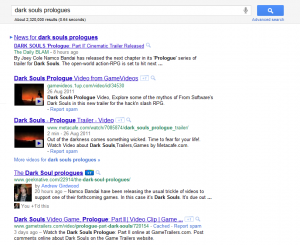The search landscape has changed dramatically in recent years and so have modern approaches to SEO. Do you remember when Google was just ten blue links? Compare that today and how the UK’s most popular search engine includes news, videos, blogs, news inserts and even more in their main results as well as persuasive social annotations. The goal of this guide is to lend a helping hand to the busy with modern SEO in mind.
Getting all technical
Once SEO (search engine optimisation) was seen as a technical exercise and one that often happened to a website after it had been built. If a company wanted to ‘SEO’ its website, in the early days, it was the technical team who paid for it. These days it is the marketing team. Actually, these days I am not surprised to see the Chief Marketing Office present.
Certainly, the technical nature of SEO has changed. Today it is rare to see sites that the search engines can neither access nor read. Obstacles like session based URLs, content in frames or even Flash are not common. A technical barrier that gaming sites need to be aware of is that unless your site is of extra special interest to the search engines they will not make any attempt to interact with your forms and therefore cannot log into restricted or sign-up required forums.
Another aspect of technical SEO which people now spend less time worrying about is the use of the correct tags for keyword emphasis. In yester years it would be beneficial to make sure anchor text content matched with title tags and h1 tags on the target page. For example, it would be good to have a category called ‘PlayStation 2’ so that lots of links containing the phrase ‘PlayStation 2’ would point to a page that had ‘PlayStation 2’ in the title and in the h1 tag. Over time, as millions of blogs have managed to get this basic combination right the relevancy signals the search engines pick up from this trilogy has declined but it is still certainly worth doing.
While we’re on the subject of blogs it’s worth calling out both the All In One SEO Pack and WordPress SEO by Yoast as two very easy ways to SEO a WordPress blog. I started with the All in One SEO Pack and updated my preference to WordPress SEO. I feel it’s more modern and offers better compatibility with the likes of Facebook’s Open Graph markup.
Today, one of the technical areas which are certainly worth spending time on is in feeds – I strongly recommend joining the Google Webmaster Console and making sure you have a sitemap XML file in place.
Another productive area is spending time to ensure the right RDFa is in place to enhance data that Google cares particularly about. For many gamer sites this will mean enhanced review data. You can read more about structured markup at Schema.org and test what Google thinks of your efforts with the search engine’s Rich Snippets testing tool.
One area I certainly recommend for all authors is the combination of RDFa to ensure Google understands dates and ownership on any content you produced, combined with the use of a Google Profile (closely coupled with Google+ these days) to decorate search results with your profile. Why? Not only does this help to automatically personalise your content – thus helping to promote it to your connections – this will help the click through ratio from the results. In the modern world of annotations you should think of SEO as being as much about as improving your click throughs as much as it was once about boosting positions.
For example, here’s my success with a very quick post I did for Dark Souls that simply threw two videos together. The screen grab below shows just how hard it would be for a ‘mere’ text link to attract any click in such a visual search result.
URLs and Site Structure
It can be beneficial to have keywords in URLs – but only slightly. The presence of keywords in the URL tends to encourage people to use those same words when referring to the page. However, it’s far better to have short and snappy URLs. These are less likely to be shortened by some social sharing networks and are better for recall. The best URLs are still query string free.
Each page needs its own URL. If it has more than one then you’re in duplicate content issues which are worth avoiding. If you start to dabble with Ajax then you may have more pages than you have URLs. If that still tempts you then you need to investigate running a headless browser on your server and following Google’s Ajax protocol.
URL examples
Dreadful: www.example.com/page.php?sessions=2349234239434723dfs2323
Dreadful: www.example.com/aJaxGateway
Bad: www.example.com/blog.php?cat=23&page=32
Good: www.example.com/nintendo/wii-u/
Site structure is still worth thinking about. Imagine you only have 10 seconds of Google’s time and most people link to your homepage when referencing your site. Do you want Google to spend all of that time exploring your forum archives from 2007 or picking up on your fresh content?
Homepages should be a gateway to fresh content. As a result the best site structure in terms of search is broad and shallow. Blogs that offer links to archives and category pages can often quickly and naturally achieve this effect but it’s more of a challenge for retail sites.
Keywords and content
Google says that 15% of all searches on any day are unique. In other words; they’ve never been used for a search before and no amount of backwards facing keyword research would have predicted them.
I’m not a fan of keyword research. For gamers there are some core keyword groups that common sense scream are important; words like Xbox, PlayStation, Sony, Square Enix, EA, etc. I’ll admit it’s important not to ignore them entirely on your site and they may well be a key part of your navigation but unless you aspire to the heights of IGN and Kotaku these keywords may be better placed in a secondary tier for your efforts rather than ones you tackle head on.
Old SEO talked a lot about “keyword density”. Forget that. Instead write as best quality content as you can possibly can and just keep headlines in mind. If you don’t actually say “The best games for the iPhone 5” in your content then there’s no way search engines will consider your content particularly relevant for “best games iPhone 5” but that does not mean you need to repeat the phrase again and again throughout the article. Mind you; one of the reasons why list posts are popular is because readers enjoy them and they are a lazy way to thump home target phrases. Rather than “keyword density” being your focus, think instead about “keyword confidence” – is it clear what the content is about – and producing the sort of content that people are likely to share on Google+, Twitter, Facebook and other networks.
Calendars are an important part of keywords and traffic. Take the “best games for the iPhone 5” concept. Is now a good time to be writing that post? Would we have been better off trying to compile it two months ago? Or would we be better waiting another two months?
On a broad timing scale Google Insights is a fantastic free tool for you to see when people start to search for things. An easy example of this is Christmas – just when do people start planning to buy consoles for Christmas presents. I strongly recommend a content calendar for any gamer site.
The quick and the dead
In modern SEO speed matters. If you’re the second site that Google or Bing finds that mentions “New Game XYZ” then you are in a much stronger position to be an authority on “New Game XYZ” than all the others.
For the “race to second” here are some of the tricks I use are:
- Subscribe to Press Release sites like PR News Wire, Brinkwire and, of course, Gameleon. In particular, I look for sites that offer good RSS feeds. I live by my Google Reader.
- Google Reader. This free bit of kit is second only two WordPress in my essential blogger list. Earlier this year I compiled a tips cheat for Search Engine Watch.
- Subscribe to RSS feeds from Facebook Pages. Personal Facebook pages don’t have an RSS option but from the bottom of the left menu from brand sites like Play.com. Twitter also offers RSS feeds for search results.
- Make sure search engines find your content quickly – offer RSS feeds of your own, make sure you’re using Bing and Google’s Webmaster Console and use sitemap feeds.
- Consider whether it makes sense to do short, announcement style posts, which can go up quickly in advance of longer and more detailed posts. If you’re reviewing games – should you have a “first impressions” post that acts as a prequel to the main review?
- Respect embargos down to the last minute. Unless you’re TechCrunch you don’t really have the option to stuff embargos. Stay in the content collecting good books and respect them – down to the last second. If possible prepare your content ahead of time and publish the very second you can. In many blogging platforms you can schedule posts. Do so. I’ve had blog posts go live while I was in the air above London before and it worked very well.
- PubSubHubbub is even faster than RSS. The Google backed Pubsubhubbub is worth knowing about as it encourages even quicker adoption of your content.
Traditional, equally strong, tactics are to monitor the publisher sites directly, develop strong relationships with PR and digital agencies that may be working with game producers and retailers. Don’t be one of those bloggers who take offense if someone with “PR” in their job title tries to give you some news.
You may also find that some PR companies have their own extranet for pushing out news and resources to bloggers and other authors. Sometimes content appears here first.
There are ways to be first to popular keywords. Here are just a few examples;
- See a relevant ad on TV? Produce content about the music on it or any actors who appear. For example, “Who sings the song in the Halo ad?” is a fantastic blog post title.
- Predict sequels - bloggers can speculate about games that retailers and production houses cannot. Be as brave as you like here.
- Ask for interviews – you’ll get more successes here than you might think and it is an easy chance to ask a developer, artist or designer directly about their next project.
It’s also true that Google dislikes slow web servers. This may be a tie-breaking issue when it comes to natural search but in paid search Google will penalise advertisers with reduced Quality Scores.
Promoting your content
In the early – and perhaps quite recent years of SEO – a lot of the promotional focus was on links. Google encouraged us to think of links as votes except not every vote was equal. A page with relevant content, no sign of trying to game the system and with plenty of trusted links was likely to be more deserving of high positions than a page with relevant content, no cheating but few links.
Today we should think of links as one type of “Quality Signal” that modern search engines look at. I think it was in 2005, in a conference in London, that I heard Google’s Head of Spam openly encourage the audience to look beyond links and at wider Quality Signals. It’s taken a while for the industry to catch up. Indeed, links themselves may be judged by signals – Google may well look at the information around a link before deciding whether it counts as a vote of confidence for the content it relates to.
It is suspected there are a hundreds of quality signals. Here are just a few;
- Is the content unique or stolen?
- Is the domain registered to a fake address?
- What are the quality of the fresh inbound links?
- Is the server stable?
- Is the site quick? (I use Amazon S3 as much as possible with an eye on speed)
- Is there a buzz about this content (are sites in Google News talking about you?)
- The number of +1s (add the button here)
- The number of Likes, Shares and Tweets content has had
- Is the content timely?
- Is the site part of a bad network? (Google banned the entire .co.cc sub-domain recently – some 11M sites)
- Is the site covered in dodgy ads?
Some practical examples including simply tweeting about your content and membership of Gameleon or The Games Tribe can help as they help surface content created by the collective. You may find joining gaming communities like Empire Avenue or adding technologies that encourage sharing like Meebo to be useful.
Want to encourage people to +1 your content? Share it on Google+ as that’s where a host of early Google adopters are. I have the +1 button added to my Chrome browser so I can promote my content even if the webmaster has not added the button to their site. I mean, I’ve not yet added it to my gamer blog. I’m still looking for a plugin solution that’ll give me a graceful way of offering Like, Tweet and +1 altogether.
Some essential reading on this subject comes from Google themselves in a discussion on what counts as a high quality site in the post-Panda world. Panda was the name given to the Google update that accepted there was a difference between spam (junk content or attempts to game the system) and low quality sites.
I can summarise modern SEO as the need to create content worthy of discussion and reference – while being relevant to the topics people search for – combined the techniques necessary to bring that content to people’s attention.
One of the mistakes I made on my little hobby gamer site is not setting up a Facebook page for it. I thought my reasons where good at the time – I wanted to drive people to my blog, encourage discussions there, get people to tweet and share my post URLs. In retrospect that may have been a mistake because the extra sharing having a Facebook page to showcase my posts is a benefit that outweighs any loss of focus on the blog may cost.
Traps to avoid
Photo credit http://www.flickr.com/photos/chasingfun/2200393834/
There are plenty of traps to avoid. One tip is certainly to avoid any person or company who suggests they have a special, behind the curtain, relationship with Google or Bing that enables them to guarantee results. They don’t. Avoid the cowboys.
Google very strongly reserves the right to run their search engine in the way they see fit. One area that annoys Google, especially, is in paid links. It is not just a matter of resisting the temptation to buy them but owners of niche sites need to avoid selling them too. Google finds it much easier to be certain of who is selling links than who is buying them. What’s at risk? You risk picking up negative quality signals, becoming a site that other content producers don’t want to be associated with and potentially even running into trouble with the ASA for non-disclosed adverts. The latter is especially a problem when people offer to write articles or other content for your site. An even higher authority than the Advertising Standards Authority is The Office of Fair Trading who investigated the blogging network Handpicked Media in late 2010.
Also avoid the temptation to re-use too much of other people’s content. The search engines dislike duplicate text. When you get a press release take the time to, at least, cut it up and splice in your own comments and quips. Do enough to make it unique – think about it as adding value.
A final tip is simple to produce a site that you are proud of. If your site is one that people like and recommend to friends then you’ll naturally earn all the quality signals (links, shares, buzz, etc) that Google and Bing look for. This is a far better, cheaper, more robust tactic than employing cowboy techniques to try and trick the search engines.
About the author
 Andrew Girdwood is the Media Innovations Director for bigmouthmedia and has worked with several large gaming brands and retailers on their search strategy. Andrew is a registered user of Gameleon and his hobby gamer blog, Geek Native, is a small but proud member of the Games Tribe.
Andrew Girdwood is the Media Innovations Director for bigmouthmedia and has worked with several large gaming brands and retailers on their search strategy. Andrew is a registered user of Gameleon and his hobby gamer blog, Geek Native, is a small but proud member of the Games Tribe.






